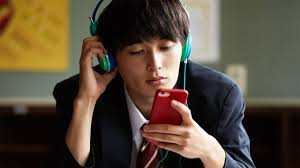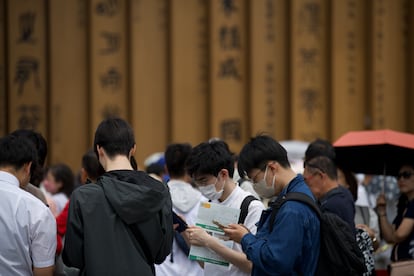A Japanese city wants to limit cell phone use to two hours a day.

The measure, which will not impose penalties for non-compliance, aims to "prevent the excessive use of devices that cause physical and mental health problems."

The Japanese city of Toyoake wants its residents to spend less time on their smartphones. The commuter town of 69,000 located on the outskirts of Nagoya will urge all cell phone users to limit their usage time to two hours a day outside of work or school, according to a proposed municipal ordinance. The groundbreaking regulation, which has not yet been approved, will not be binding and does not include penalties for exceeding the set limit, but it has already sparked heated debate in a high-tech country where the use of these devices is—as in many societies—widespread.
The Toyoake municipal government in Aichi Prefecture, central Japan, announced the proposal on August 21, and its mayor has had to come forward to explain himself. “This does not mean that the city will limit the rights of its residents or impose obligations on them,” clarified Mayor Masafumi Koki, according to the Japanese media outlet Mainichi . “Rather, I hope it serves as an opportunity for each family to reflect and discuss the time they spend on smartphones, as well as the time of day these devices are used.”
The city council argues that excessive smartphone use during leisure time outside of work and school has a negative impact on a wide range of age groups, from children to adults , and has based the two-hour limit on data and materials from the Ministry of Health. It also asserts that this is the first ordinance of its kind in Japan targeting all residents of a municipality.
The draft, scheduled for a vote on September 22, also urges primary school students (ages 6 to 12) to avoid smartphones after 9 p.m., and advises secondary school students (ages 12 to 18) and older not to use them after 10 p.m.
The proposal, presented to coincide with the start of the school year, recognizes that smartphones, personal computers, and tablets are necessary tools, but warns that excessive use of social media and video streaming can have a negative impact on health and family life.
The measure aims to "prevent excessive use of devices that cause physical and mental health problems, including sleep problems," and the ordinance was chosen "to convey a specific message and ensure that citizens take it seriously," according to the mayor, who also expressed openness to discussing amendments. If approved, it would take effect on October 1.
The initiative has been met with suspicion. The city has collected more than 120 comments on the proposal, and around 80% have expressed their opposition, questioning the existence of "the right to restrict freedom." A few, however, have supported it: "I have long observed smartphone dependence and urge the ordinance to be passed," said one resident, as reported by Mainichi . It has also sparked an online debate, with users criticizing the fact that two hours isn't enough time to read a book or watch a movie.
The mayor has had to clarify that smartphone use during non-recreational activities (such as watching videos while cooking or exercising, online learning, and practicing for an e-sports tournament) would not count toward the two hours, according to the BBC.
Japanese youth spend an average of nearly five hours a day online during the week, and around 65% of 10-year-olds already have their own smartphone , according to a survey by the Japanese government's Children and Families Agency published in 2024.
Toyoake's measure is unprecedented. In 2020, the Japanese prefecture of Kagawa already promoted a regulation limiting video game use for minors under 18 to 60 minutes per day during school days, and 90 minutes on non-school days. It also proposed a digital curfew, between 9 and 10 p.m., depending on the age of the minors. The regulation, like the current proposal, did not include sanctions and left the responsibility of ensuring compliance with it to parents and guardians. It was the first legislation of its kind passed in Japan, and although one user challenged it in court, a court upheld its constitutionality in 2022.
Guillermo Abril Beijing - El Pais, Spain






